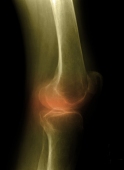
THURSDAY, March 11 (HealthDay News) — A knee replacement can help improve an elderly person’s balance, according to a new study.
Balance problems and increased risk for falls are common among seniors with severe knee osteoarthritis, the result of worn cartilage. Falls are the leading cause of injury for seniors in the United States, and hip fractures caused by falls can prove deadly.
“Balance is critical to the elderly, especially those with knee problems,” Dr. Leonid Kandel, an orthopedic surgeon at Hadassah Mount Scopus Hospital in Jerusalem and lead author of the study, said in a news release from the American Academy of Orthopaedic Surgeons. “This study reinforced our hypothesis about how an osteoarthritic patient’s function is compromised, not only due to pain but also by balance.”
The study included 63 people, with an average age of 73, who had total knee replacements. One year after surgery, all showed significant improvement in a number of measures of balance.
There was a stronger link between improved balance and the ability to walk and perform daily activities than there was between reduced pain and the ability to walk and do daily activities, the study found.
“We are learning that pain relief may not be the only benefit that improves function after knee replacement,” Kandel said. “This improved balance is a significant quality-of-life change in elderly patients.”
The study was to be presented Thursday in New Orleans at the annual meeting of the American Academy of Orthopaedic Surgeons.
More information
The American Geriatric Society’s Foundation for Health in Aging has more about seniors and joint replacement.

